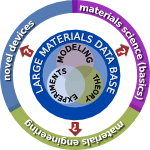 Welcome Contact |
ScopeMany, probably most, areas in the basic and applied sciences and engineering are increasingly facing the challenge of dealing with massive amounts of data, nowadays commonly addressed as „big data“. This big-data challenge is not only about storing and processing huge amounts of data, but also, and in particular, it is a chance for new methodology and understanding, as it opens qualitatively new routes for doing research.  For materials science it is already clear that in terms of properties and functions, big data are structured, and in terms of materials properties and functions, the space of all possible materials is sparsely populated. Finding this structure in the big data, e.g., asking for efficient catalysts for methane formation, good thermal barrier coatings, shape memory alloys, or thermoelectric materials for energy harvesting from temperature gradients, may be possible, even if the actuating physical mechanisms of these properties and functions are not yet understood in detail. Novel big-data analytics tools, e.g., based on machine learning and in particular compressed sensing, promise to do so. Finding structure in big data is just one example of a promising route in big-data-driven materials science. However, at present there is a significant hype associated with the term “big data”. Often, promises are not well founded, because trustful big-data analytics tools and error bars associated with these tools are hardly established. Thus, from a science perspective, certainly for materials science and engineering, “big-data-driven science” is a just emerging field. However, there is hardly any doubt that this field will considerably affect the way science is done in the future. We identify these two outstanding challenges in the "big-data driven materials science":
The aim of the workshop is to put in contact the community that develops models and methodologies for the data analytics with the continuously growing part of the materials science community that is applying those models and methodologies to relevant problems in the field. The purpose of this cross-breeding is on one side to expose the material scientists to novel, state-of-the-art and beyond, methods; on the other side, to stimulate the theoretical data analytics and management community with practical problems whoe solution may require further advance in their disciplines. ORGANIZERS
IMPORTANT DATES
SPONSORS |


